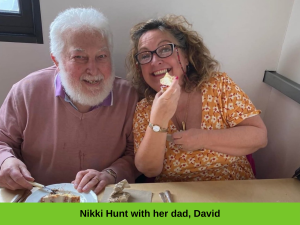
In the fourth of our blog posts marking Dementia Action Week, we meet Nikki Hunt and find out about the support her family has been getting from ADSS.
“It’s still very early days, “Nikki says. “My dad David was diagnosed with Parkinson’s and dementia probably about eight months ago now, but it’s only recently as he’s started to go downhill more rapidly that we’ve started to realise that we need some help.”
Nikki paints a vivid picture of the confusion and anxiety that can surround a dementia diagnosis, particularly in those early stages when the person with dementia may be fighting to maintain their independence. “Dad’s always been very intelligent – and very stubborn!” she says. “Even now he won’t do anything he doesn’t want to do, including taking his medication. Sometimes it’s really tricky to know what to do for the best.”
As is often the case, it took a crisis for Nikki to reach out. “Dad had a fall,” she says. “We don’t know how many hours he was lying there for. He went into hospital for a while before being sent home again, but it’s clearly given him a big knock. Since then, things have been much more difficult for him and my mum. Fortunately my daughter-in-law knew about ADSS from the support they’d given to her grandma, and she suggested we get in touch.” 
Within a few days, a Dementia Coordinator had contacted Nikki’s mum. “I was in such a state when I contacted them.” she says. “I didn’t know whether they were the people to help us. I didn’t even know what help we needed. But it’s been amazing. For the first time my mum felt like she had someone to talk to that wasn’t family, and that could just deal with the situation calmly and objectively.”
The Dementia Coordinator spoke to David, who was becoming increasingly anxious and isolated following his fall. “She really boosted his confidence,” Nikki says. “I couldn’t believe the difference when I next saw him. She got him up and out again, meeting his friends and going places. She just said to him, ‘Life is for living. So while you can, get out there and live’.” Read more about how socialising and staying connected can help people with dementia.
ADSS have also provided practical help with paperwork and finances. “Mum and dad are now getting some extra benefits they didn’t know they were entitled to,” says Nikki. “That’s been so, so helpful.” Find out more about the financial support available for people with dementia and their carers.
There’s also the reassurance of knowing where to go for support as David’s illness progresses. “With Dad, he’s always been so independent he doesn’t really want to accept that he needs help,” Nikki says. “You’ve got to put the idea out there and just wait. Now we’ve got ADSS, though, I feel much more confident that I know what support is available to us. It’s like having an extra limb. It’s just brilliant.”
As Nikki’s experience shows, diagnosis is key to accessing the advice and support available for people with dementia. “People often think the worst when they first get a diagnosis,” says Katie Antill, CEO at ADSS. “But with the right support, people can live very well with dementia.”
Here are 5 reasons why it’s important to get a diagnosis if you think you or someone you care for could be showing signs of dementia:
If you are in Kent and Medway and have recently been diagnosed with dementia or have concerns about your memory, an ADSS dementia coordinator can help you find your way and get the support you need. Give us a call today on 08000 352221 or email info@alz-dem.org to find out how we can help.